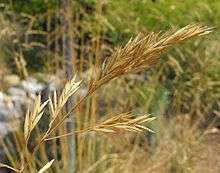Festuca californica
| Festuca californica | |
|---|---|
 | |
| Scientific classification | |
| Kingdom: | Plantae |
| (unranked): | Angiosperms |
| (unranked): | Monocots |
| (unranked): | Commelinids |
| Order: | Poales |
| Family: | Poaceae |
| Genus: | Festuca |
| Species: | F. californica |
| Binomial name | |
| Festuca californica Vasey | |
Festuca californica is a species of grass known by the common name California fescue.
This fescue species is native to the U.S. states of California and Oregon, where it is a member of many plant communities, including chaparral and oak woodlands. [1] [2]
Description
Festuca californica is a clumping perennial bunch grass, without rhizomes, that grows in greenish gray tufts.
It reaches anywhere from 1.5–4.5 feet (0.46–1.37 m) in height, and 1.5–3.5 feet (0.46–1.07 m) in width. [3] The green-gray leaves are narrow, and can reach 2 feet (0.61 m) long.
The inflorescence, on stems reaching up to 6 feet (180 cm), holds spikelets, which are each 1 to 2 centimeters long. The flowers are in large open sprays, in the spring and summer. The plant reproduces from seed and from buds located at the base of the clump.
Uses
Cultivation
Festuca californica is cultivated as an ornamental grass by specialty plant nurseries, for planting in traditional gardens and as a potted plant, for drought tolerant and wildlife gardens, and for natural landscaping projects. [4][5][6]
It is planted under Coast live oaks (Quercus agrifolia) in gardens, being a drought tolerant understory not requiring summer watering that can endanger the trees. [7] It is also planted in landscapes for slope stabilization and erosion control, due to its deep and dense network of roots.
Cultivars
Cultivars are grown, with different foliage color and texture aesthetic variations, they include:
- Festuca californica 'Serpentine Blue' — blue grey-green. [8] [9]
- Festuca californica 'River House Blues' (Ron's California Fescue) — chalky blue. [10]
- Festuca californica 'Gabilan Blues' — shiny light blue. [11]
- Festuca californica 'San Rafael Blue' — silver blue-green. [12]
- Festuca californica 'Blue Fountain' - Suncrest Nurseries — chalky blue. [13]
Restoration
In ecological restoration projects, Festuca californica is used with other local native grasses for restoring California coastal prairie habitats.
See also
- Native grasses of California
- List of California native plants
References
- ↑ USFS: "Ecology of Festuca californica"
- ↑ Jepson
- ↑ Redding Watersmart: Festuca californica
- ↑ Las Pilitas Horticultural Database: Festuca californica (California Fescue )
- ↑ Lady Bird Johnson Wildflower Center: Festuca californica
- ↑ Bewaterwise.com: California Fescue
- ↑ Bay Laurel Nursery: "Suggested Plants Compatible With Oaks"
- ↑ Yerba Buena Nursery: Festuca californica 'Serpentine Blue'
- ↑ Contra Costa water saving plants.com: Festuca californica 'Serpentine Blue'
- ↑ San Marcos Growers: Festuca californica 'River House Blues'
- ↑ Suncrest Nurseries: Festuca californica 'Gabilan Blues'
- ↑ Bay Natives Nursery: Festuca californica 'San Rafael Blue'
- ↑ Suncrest Nurseries: Festuca californica 'Blue Fountain'
External links
| Wikimedia Commons has media related to Festuca californica. |
- CalFlora Database: Festuca californica (California fescue)
- Jepson eFlora-TJM2 — Festuca californica
- USDA Plants Profile for Festuca californica (California fescue)
- Festuca californica — U.C. Photo gallery